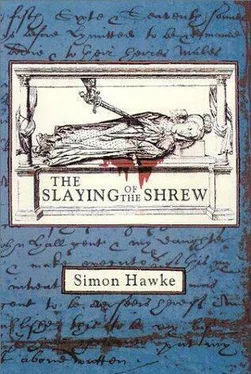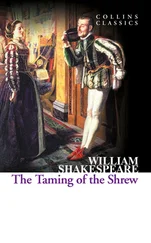Simon Hawke - The Slaying Of The Shrew
Здесь есть возможность читать онлайн «Simon Hawke - The Slaying Of The Shrew» весь текст электронной книги совершенно бесплатно (целиком полную версию без сокращений). В некоторых случаях можно слушать аудио, скачать через торрент в формате fb2 и присутствует краткое содержание. Жанр: Исторический детектив, на английском языке. Описание произведения, (предисловие) а так же отзывы посетителей доступны на портале библиотеки ЛибКат.
- Название:The Slaying Of The Shrew
- Автор:
- Жанр:
- Год:неизвестен
- ISBN:нет данных
- Рейтинг книги:5 / 5. Голосов: 1
-
Избранное:Добавить в избранное
- Отзывы:
-
Ваша оценка:
- 100
- 1
- 2
- 3
- 4
- 5
The Slaying Of The Shrew: краткое содержание, описание и аннотация
Предлагаем к чтению аннотацию, описание, краткое содержание или предисловие (зависит от того, что написал сам автор книги «The Slaying Of The Shrew»). Если вы не нашли необходимую информацию о книге — напишите в комментариях, мы постараемся отыскать её.
The Slaying Of The Shrew — читать онлайн бесплатно полную книгу (весь текст) целиком
Ниже представлен текст книги, разбитый по страницам. Система сохранения места последней прочитанной страницы, позволяет с удобством читать онлайн бесплатно книгу «The Slaying Of The Shrew», без необходимости каждый раз заново искать на чём Вы остановились. Поставьте закладку, и сможете в любой момент перейти на страницу, на которой закончили чтение.
Интервал:
Закладка:
“I quite agree,” said Worley, nodding. “ ‘Tis a compassionate suggestion, and a very sensible one, as well. The sooner after death a body is interred, the better. Not only does it aid the bereaved in coming to grips with grief, but it lays the dead to rest before corruption can set in. I shall take the liberty of making certain his steward makes immediate arrangements to place Catherine in the family vault. It may be presumptuous, but under the circumstances, I suspect that I may be forgiven the presumption. Godfrey is doubtless devastated by what has happened. He shall need to have some help.”
“I should go and see how he is bearing up,” Elizabeth said. “And I should look to poor Blanche, as well.”
“Indeed, you should,” Worley agreed.
“ Elizabeth…” Smythe began, but she interrupted him.
“We shall speak later, Tuck. For the present, I must go and try to comfort the Middletons.”
“Of course. I understand.”
As she hurried away up the stairs, Smythe turned to Shakespeare. “Have you told Sir William everything?”
“Not yet,” Shakespeare replied. “ Elizabeth was here. ‘Twould have been a trifle awkward.”
“What do you mean?” asked Worley. “What is awkward? What more is there to tell?”
“A great deal more, Sir William,” Shakespeare said. “It has been a most unfortunate and trying day, a beastly trial for all concerned. And I, for one, could certainly use a drink.”
He took out a small flask and unstoppered it, then started to raise it to his lips. In that instant, Smythe recognized the flask.
“Will!” He reached out and snatched it from him just before he drank. “For God’s sake, man! The poison !”
Shakespeare paled. “Oh, sweet, merciful heavens! What in God’s name was I thinking?”
“Poison?” said Sir William, with a frown. “What poison?”
“You had not told him?” Smythe said.
“I had not,” Shakespeare replied, shaken by what he had almost done. He ran his fingers through his thinning hair distractedly. “ Elizabeth did not seem to know and I did not wish to upset her any further, though it shall not be long before she hears about it, I am sure. The rumors are already flying among the guests. ‘Tis entirely my fault, I fear. I should have been more discreet down at the barge, rather than blurt it out as I did.” He put a hand up to his brow, as if he suddenly felt faint. “Odd’s blood, I cannot believe I nearly drank the vile stuff!”
“Right,” said Worley, grimly. “Come with me.” He led them to the library in a brisk manner that made it clear he knew his way around the house. Once there, he closed the door behind them firmly and looked around to make sure they were alone. “Now… what is all this about poison?” he asked, frowning.
“Catherine Middleton was apparently drinking from this flask during her journey on the wedding barge,” said Smythe, holding it up for Sir William to see. “Will found it lying stoppered at her feet.”
“I opened it and sniffed to see what it contained,” said Shakespeare. “And I knew at once that there was something wrong.”
“Let me see it,” Worley said.
Smythe handed it over. Worley unstoppered it and took a tentative sniff. He frowned. “Brand,” he pronounced at once, identifying it correctly. “But for a surety, ‘tis mixed with something else. There is a curious, uncommon, musty sort of odor.” “I thought so, too,” said Shakespeare.
Worley sniffed the flask once more, frowned, then shook his head. “I cannot put a name to it. And you say Catherine was drinking from this?”
“ ‘Twould appear so,” Smythe replied, “although we did not see it for ourselves.”
“But Will found it lying stoppered at her feet, you said. If she were drinking from it, and ‘twere poisoned, then would she not have dropped it while it was still open?”
“Perhaps,” said Shakespeare. “But like one who has already had too much to drink and falls insensible in the act of raising the cup once more, if she had already drunk from it earlier and the poison was not very quick, then she may have been preparing to open the flask to take another drink when it finally took effect, causing her to drop the flask unopened.”
Worley nodded. “That is certainly possible. And ‘twould explain why the flask was still stoppered and unspilt. But though it may smell peculiar and raise a foul suspicion, we must nevertheless find out for certain if ‘tis poison and, if possible, what the poison is. ‘Twill take a skilled apothecary to make such a determination.”
Smythe and Shakespeare exchanged glances and simultaneously replied, “Granny Meg.”
“She is the cunning woman who had helped you once before, as I recall,” said Worley.
“Aye,” said Smythe. “She has an apothecary shop in the city.”
“And she is possessed of uncommon skills,” added Shakespeare.
“Her name is not unknown to me,” said Worley. “But ‘tis said she is a witch.”
“If so, then she is an honest one,” said Smythe. “And witch or no, she knows her herbs and potions. If anyone can tell us what manner of poison has been put into this wine, she is the one.”
“So be it,” Worley said, nodding. “Middleton has a light carriage in which you can make the journey with dispatch. In the meantime, I shall see to matters here and send word to Her Majesty that I shall not be rejoining her because of pressing matters that require my immediate attention.”
“There is more, Sir William,” Smythe said.
“What, more? Come on, then, out with it.”
As quickly as he could, Smythe told him about what he had overheard the previous night in the maze, and how an attempt had been made upon his life to silence him.
“I see,” Worley said, when he had finished. He fixed Smythe with a sharp look. “And how did it happen that you were in the maze to overhear this intrigue in the first place?”
Smythe hesitated awkwardly.
“Come on, Tuck, tell him, for God’s sake,” said Shakespeare. “There is no shame in it.”
“I… was following Elizabeth,” said Smythe, somewhat sheepishly. “We had quarrelled previously, some days ago, and I suspected that she was seeing someone else.”
“And was she?”
“I never learned the truth of it,” admitted Smythe. “I lost her in the maze, and then I heard the voices of those men, and you already know the rest. More than anything, I feared that they would stumble upon her and she would come to harm. Hence, I shouted out to warn her and to draw them off.”
“Well, if ‘twas ever any doubt that foul play was at hand, this certainly dispells it,” Worley said. “Whoever those two plotters are, it seems evident from their attack on you that they will not stop at murder to achieve their goal. And now with Catherine’s tragic death…” He grimaced and shook his head. “Catherine was, G6d rest her soul, a strong-minded young woman. Godfrey had been trying to get her married off for quite some time, but whether ‘twas justified or not, she had a reputation as a shrew. Her sister seems to have a milder disposition, one most men would doubtless find preferable in a wife, but ‘twas well known that Godfrey would never have consented to the betrothal of his younger daughter before the older one was married. And now Catherine is dead… ‘out of the way,’ as that miserable scoundrel put it.”
“And with no sons to inherit Middleton’s fortune, ‘twould all go to Blanche now,” Shakespeare said. “Or, more to the point, to whoever should become her husband.”
“Indeed,” said Worley. “And whoever marries Blanche will likely find her far more manageable than ever her sister would have been.”
“I am not so sure of that,” said Smythe, “but either way, methinks Master Middleton should know of this.” He sighed heavily. “If I had only said something last night…” His voice trailed off.
Читать дальшеИнтервал:
Закладка:
Похожие книги на «The Slaying Of The Shrew»
Представляем Вашему вниманию похожие книги на «The Slaying Of The Shrew» списком для выбора. Мы отобрали схожую по названию и смыслу литературу в надежде предоставить читателям больше вариантов отыскать новые, интересные, ещё непрочитанные произведения.
Обсуждение, отзывы о книге «The Slaying Of The Shrew» и просто собственные мнения читателей. Оставьте ваши комментарии, напишите, что Вы думаете о произведении, его смысле или главных героях. Укажите что конкретно понравилось, а что нет, и почему Вы так считаете.












